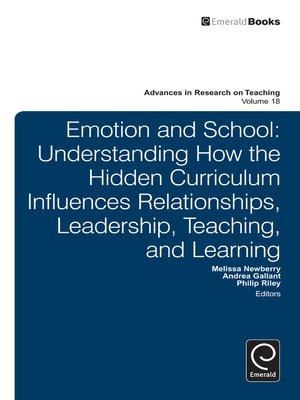Advances in Research on Teaching, Volume 18
ebook ∣ Emotion in Schools: Understanding How the Hidden Curriculum Influences Relationships, Leadership, Teaching, and Learning · Advances in Research on Teaching
By Melissa Newberry

Sign up to save your library
With an OverDrive account, you can save your favorite libraries for at-a-glance information about availability. Find out more about OverDrive accounts.
Find this title in Libby, the library reading app by OverDrive.



Search for a digital library with this title
Title found at these libraries:
| Library Name | Distance |
|---|---|
| Loading... |
Emotion and School: Understanding How the Hidden Curriculum Influences Relationships, Leadership, Teaching, and Learning reports the history, developments, applications and possible future directions of relational and emotion-focused school research from North America, Asia-Pacific and Europe. It begins by scoping the field from both a psychological and sociological perspective. The chapters frame the key debates in the research literature while adding the unique perspective of experts from the field, before honing in on the school: the administration context, teacher context and student context. The book explores the contests within the field, including psychological and socio-cultural knowledges, individual and collectives, emotions as inputs/outcomes, and the false binary of emotions and rational thought. The middle sections of the book take these perspectives into the field to see how they operate in schools. First, methods for identifying and responding to emotion and relationships in schools are presented. Second, the positive and negative products of emotions and emotion work are outlined and their effects on relationships and school functioning are discussed. The book provides readers with new insights into the hidden curriculum. It offers new ways of working with emotion in a variety of relationships for positive outcomes: the selection and induction of teachers; the role of emotions in leading; emotional and emotion learning; and, the inter-relationship between emotions, school culture, classroom and staffroom dynamics.







